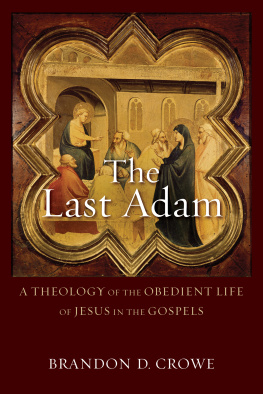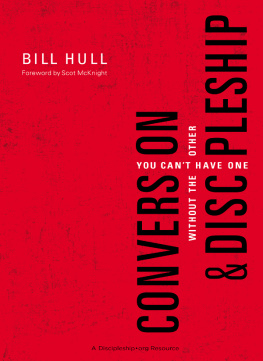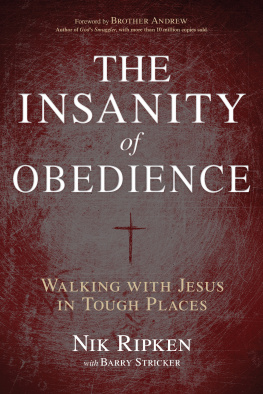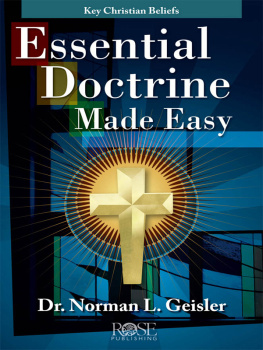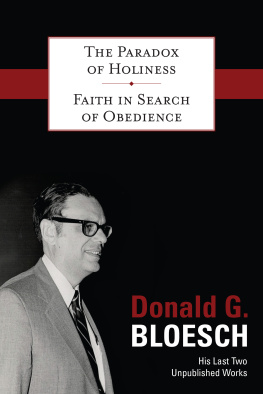Epigraph
Thy Works, Not Mine, O Christ
Thy works, not mine, O Christ, speak gladness to this heart;
they tell me all is done; they bid my fear depart.
Thy pains, not mine, O Christ, upon the shameful tree,
have paid the laws full price and purchased peace for me.
Thy cross, not mine, O Christ, has borne the awful load
of sins that none in heavn or earth could bear but God.
Thy righteousness, O Christ, alone can cover me:
no righteousness avails save that which is of thee.
To whom, save thee, who canst alone for sin atone,
Lord, shall I flee?
Horatius Bonar (1857)
Contents
Endorsements
Title Page
Copyright Page
Dedication
Epigraph
Preface
Abbreviations
PART 1: DEFINITIONS
1. What Is Required?
2. The Basis of Justification
PART 2: EXEGESIS
3. The Obedience of the Last Adam
4. The Mosaic Law and Perfect Obedience
5. Jesuss Obedience and Salvation in the Gospels
6. The Obedience of the Perfect Priest
7. Obedience, Resurrection, and Salvation
PART 3: IMPLICATIONS
8. Jesuss Obedience and Our Justification
9. Jesuss Obedience and Our Obedience
10. What Is Required Is Finished
Permissions
Scripture Index
Subject Index
Back Cover
Preface
How does Jesus save his people from their sins? Following a long tradition, I argue that perfect obedience is necessary for salvation, and only Jesus meets this requirement. This does not belittle our own call to obedience, but our obedience is not the ground or basis of our acceptance before God.
This is not a new interpretation, but it has often been misunderstood and challenged. I hope to articulate this view clearly and to discuss some new angles as well. I have been addressing the topic of this book, in one way or another, for around fifteen years. It seemed fitting to bring much of the fruit of those labors together into a new, integrated, and sustained discussion for a wider audience. I am convinced that the obedience of Jesus is central to the theology of the New Testament and the Bibles teaching on redemption. I have done my best to limit the number of footnotes in this book in order to maximize readability and accessibility. Even so, I have included references (and sometimes quotations) where I follow an author in a particular way of framing a point or where an author has captured with particular clarity and precision the matters at hand. Sometimes we need to hear the older voices speaking for themselves.
Thanks to Bryan Dyer, Eric Salo, and the entire professional team at Baker Academic for supporting and shepherding another project through to completion. I express my gratitude to the trustees of Westminster Theological Seminary for granting a professional advancement leave in the first half of 2019, which allowed me to write the bulk of this manuscript. I am grateful for my colleagues at Westminster Seminary, who persistently encourage, teach, and challenge me with their wide-ranging expertises. I am also grateful for those who have served as conversation partners for this book and sharpened my own thinking. A special word of thanks goes to those who took the time to offer feedback on written portions of this manuscript, especially Todd Rester, Guy Waters, Dave Garner, Pip Mohr, and David Briones. Thanks also to Pip Mohr for compiling the indexes.
The love and support of my wife, Cheryl, are incalculably valuable. I also hope this book will be of interest to my children, though I trust Ive covered the gist of the argument with them many times. I dedicate this book to my parents-in-law, Mike and Lou Webb, who have become like second parents. I am grateful for the godly legacy they have bequeathed to my wife and to our children. It is a great blessing to have loving, supportive parents; it is a double blessing to have loving, supporting in-laws as well. I have been doubly blessed.
Abbreviations
| Greek and Latin Works |
| Apostolic Fathers |
| Diogn . | Epistle to Diognetus |
| Irenaeus of Lyons |
| Epid. | Epideixis tou apostolikou krygmatos (Demonstration of the Apostolic Preaching ) |
| Haer. | Adversus haereses (Against Heresies) |
| Justin Martyr |
| Dial. |


